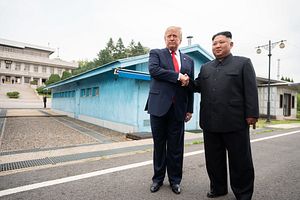The United States may be about to get another chance at working towards a limited agreement with North Korea before the year ends. Two developments point to this possibility.
First, on September 9 – North Korea’s foundation day – Choe Son Hui, the country’s foreign vice-minister, offered an apparent opening, saying talks with the U.S. could resume later this month. “We have willingness to sit with the U.S. side for comprehensive discussion,” Choe said.
Her remark suggested that the outcome of the June 30 meeting between U.S. President Donald Trump and North Korean leader Kim Jong-un could begin to be realised. At that June meeting, the two leaders had agreed to resume working-level talks.
The second development suggesting U.S. hopes of reaching an agreement could be revived was the sacking of John Bolton, Trump’s third national security adviser and a well-known hawk who opposed any deal with North Korea that did not include an agreement from Pyongyang to totally disarm itself of nuclear weapons and missiles.
The prospect of a US-North Korea deal would attract regional support. China, Russia and certainly South Korea would welcome any limited agreement. For Beijing, the prospect of a serious Washington-Pyongyang working-level process would also present a source of useful potential leverage over the US, given China’s ability to serve as a potential spoiler.
Since the summit between Trump and Kim in Hanoi, Vietnam, earlier this year, the two sides have been at an impasse. The North Koreans have resumed their ballistic missile testing – a development Trump has been willing to brush aside – while maintaining their core position.
In April, for instance, Kim said North Korea would wait until the end of the year for the U.S. to readjust its negotiating posture and come to a “bold decision”. That “decision” probably pertains to the possibility of Washington agreeing to a partial lifting of sanctions for partial North Korean measures related to denuclearisation.
Such a deal was on the table in Hanoi, but the North Koreans simply asked for too much in sanctions relief for too little on the disarmament front. A resumed working-level process, led on the U.S. side by top negotiator Stephen Biegun, would be an important development.
Since the beginning of diplomatic interactions between the U.S. and North Korea last year, the countries have not yet had true working-level talks.
Should Biegun meet his counterpart soon, that process might take place for the first time. The risk, however, is that even that may simply pave the path to another leaders’ meeting with little agreed, setting in place the ingredients for another failed summit like the one in Hanoi.
Speaking to reporters on Thursday, Trump suggested that he was open to meeting Kim again this year, for what would be their fourth summit and their third meeting this year. That the president has raised this possibility without any meaningful diplomatic progress is a mistake, however.
For North Korea, the example of what has just transpired in Afghanistan – where Trump torpedoed a deal that his envoy had been working on for months – will be a warning. What if the Biegun-led working-level track does produce something but Trump simply pulls the plug on it later?
Knowing what Pyongyang expects at this point is difficult, but Kim’s warning during his address on January 1 – that North Korea would head a “new way” if the U.S. didn’t change course – was probably credible.
Pyongyang has invested considerable energy this year in elevating its relationship with China, underscored by Chinese President Xi Jinping’s historic trip to North Korea this summer. Meanwhile, as competition between Beijing and Washington intensifies, China’s implementation of international sanctions against North Korea becomes a more tempting lever for Beijing to use.
Just as his grandfather played the Soviet Union and China off against one another during the cold war, Kim might find more room for maneuver by managing North Korea’s position between these two powers.
If talks were to resume this month, it may be the last attempt by the North Koreans to feel out whether a deal with Trump and his deputies is possible. Otherwise, the North Koreans will not only revert to their old practices of bolstering their national defence capabilities, but probably bide their time in the hope that Trump will fail to win another term in the U.S. presidential election next year.
A version of this article first appeared in the South China Morning Post. It is republished here with kind permission.

































